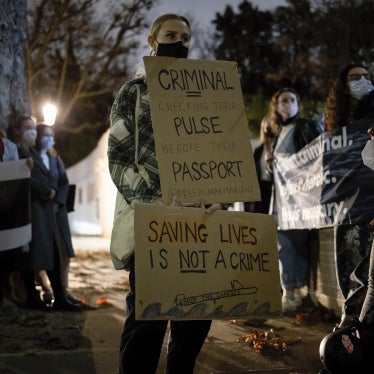Life on the streets in Spain is difficult and dangerous enough, but it is about to get much harder. The Spanish Congress is poised to approve a bill on public security designed to control and punish behavior on the street, including sanctions targeting some of the most vulnerable members of Spanish society - the homeless, people who use drugs, and sex workers.
We criticized the initial draft and the latest iteration of this bill because of the impact it would have on the fundamental rights of freedom of peaceful assembly and free speech.
Individuals who damage public property or lead to its vaguely-defined “degradation” (“deslucimiento”) could be fined up to €600. Nongovernmental organizations in Spain are worried this could lead to homeless people being fined for sleeping on a park bench or sitting on a street corner.
Local authorities are expected to move to impose ordinances once the central government law is approved. Already, several municipalities in Spain, including Barcelona, Malaga, Seville, and Granada, sanction begging. A draft law in Madrid that would do the same is pending, and likely to be enacted in 2015. Seville recently tried to increase existing maximum fines for scavenging in trash cans from €300 to €750, but backtracked in the face of strong opposition. A punitive approach to destitution and homelessness undermines social inclusion strategies and a range of basic human rights.
The bill also removes the possibility of suspending the existing fine (of up to €30,000) for consuming or possessing illegal drugs or leaving drug use equipment in a public place. Currently the fine can be suspended if the individual enters into a rehabilitation program. But under the bill only those under 18 will continue to benefit from this flexibility. Organizations in Spain argue that existing measures have proven effective in helping drug users access rehabilitation programs.
Finally, the bill would impose the same high fines on those who seek out or accept paid sexual services in public areas near where children congregate (such as playgrounds or schools). Sex workers in these areas would be subject to fines if they “persist” in working there after a police warning. Regulation of sex work is within the government’s discretion, but measures must respect human rights standards, should not place sex workers at risk, and need to be precisely and narrowly formulated so they cannot be abused to engage in harassment and discriminatory practices. The wording of this measure is vague enough to allow just that. Any negative impact on victims of trafficking needs also to be taken into account. Spanish organizations of and for sex workers have opposed the bill, pointing to the negative impact of a similar measure in place in Barcelona since 2006.
Spain’s approach to those who live and work on the streets needs to be based on respect and rights, and emphasize public health and social services over punitive enforcement.









